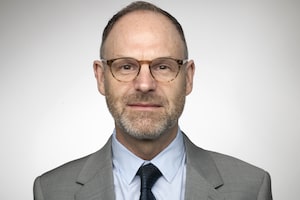German Chancellor Olaf Scholz and Canadian Prime Minister Justin Trudeau share a smile during their bilateral meeting at the G7 summit at Elmau Castle, Germany, on June 27.POOL/AFP/Getty Images
Olaf Scholz and Justin Trudeau will talk up their countries’ shared clean-energy future on the German Chancellor’s trip to Canada, which starts on Sunday. A statement released by the Prime Minister’s Office explains that “Canada and Germany have a long history of collaborating to advance the development of a clean economy and this visit will be an opportunity to formally deepen this collaboration.” The two leaders are expected to sign an agreement to explore the production of green hydrogen in Newfoundland for export to Germany.
So much for the window dressing.
Neither Mr. Trudeau nor Mr. Scholz is very popular with voters these days. But of the two, Mr. Scholz has far bigger problems. A centre-left Social Democrat whose coalition government relies on support from the progressive Green Party and the pro-business Free Democrats, he is scrambling to ensure his country can (literally) keep the lights on and factories running this winter and beyond, as it seeks to sever its dependence on Russian natural gas.
That dependence is the legacy of a series of policy mistakes perpetrated by Mr. Scholz’s immediate predecessors, the centre-right Angela Merkel and centre-left Gerhard Schröder, prodded by Green politicians. The Greens pushed to close Germany’s nuclear and coal-fired power plants. But with renewables unable to fill the gap, the country turned to Russian gas to produce electricity, heat homes and run factories. A ban on hydraulic fracturing – that was pushed by the Greens, too – prevented Germany from tapping its own shale gas reserves. Opposition to fracking also led Germany to reject importing liquified natural gas from North America.
The strategy looked feasible, for a while. Cheap Russian gas fuelled Germany’s manufacturing sector, the engine of the domestic economy. By early this year, Russia supplied 55 per cent of Germany’s gas and was poised to increase that proportion further with the completion of the Nord Stream 2 pipeline. Political and business leaders in Germany, the largest foreign investor in Russia, saw further economic integration with Russia as a win-win development that would enable Germany to wield more influence over President Vladimir Putin.
It has instead left Germany, long Europe’s economic powerhouse, on the verge of disaster.
The Russian invasion of Ukraine “has also triggered an era of reckoning with German fallacies,” German magazine Der Spiegel wrote in June. “That Russia is a reliable partner, that natural gas could never become a political weapon and that business and politics can be neatly divided. German delusions.”
The green-hydrogen future that Mr. Scholz and Mr. Trudeau will talk about will play well with their respective political bases. But it is completely hypothetical and a distraction from the pressing matters at hand. Germany needs a short- and medium-term solution to its energy crisis, not talking points from Mr. Scholz and Mr. Trudeau on the winning ways of green hydrogen.
German baseload power prices have increased six-fold in the past year, with futures contracts for 2023 delivery rising above €500 ($657) per megawatt-hour. Factories face gas rationing and consumers face skyrocketing heating bills this winter. Mr. Scholz announced plans this week to cut the value-added tax on natural gas, but the move will not make much of a difference.
On a trip to Oslo this week, Mr. Scholz came up short as Norwegian Prime Minister Jonas Gahr Store declared his country has no extra gas to sell to Germany. Mr. Scholz is pushing for the construction of a pipeline to Germany from Spain that could supply his country with Algerian natural gas and liquefied natural gas (Spain has six such terminals) imported from outside Europe. His government is firing up mothballed coal plants and is expected to postpone the closing of Germany’s three remaining nuclear reactors. But those moves will not be enough.
Finding a solution to Germany’s energy woes, one based in reality, requires facing up to hard geopolitical and economic truths. That will not be easy for either Mr. Scholz or Mr. Trudeau, who has thus far offered only tepid platitudes about “how the two countries can work together to safeguard energy security.” Deputy Prime Minster Chrystia Freeland said recently that Canada has a “political responsibility” to aid its ally, but Environment Minister Steven Guilbeault has rejected the idea of building LNG terminals here to supply Europe, citing long timelines for approvals and construction and the lack of pipelines to tidewater in this country.
“It comes down to what is essentially a moral choice about being a good neighbour to our friends abroad while protecting our energy independence at home,” a Public Policy Forum report said this week. “Do Canadians vacate the [LNG] field for the sake of their own internal [climate] scorecard, even if it means leaving the market to low-ESG [environmental, social, governance] performing competitors and condemning the world to even higher emissions?”
Hard truths, indeed.
Keep your Opinions sharp and informed. Get the Opinion newsletter. Sign up today.
 Konrad Yakabuski
Konrad Yakabuski